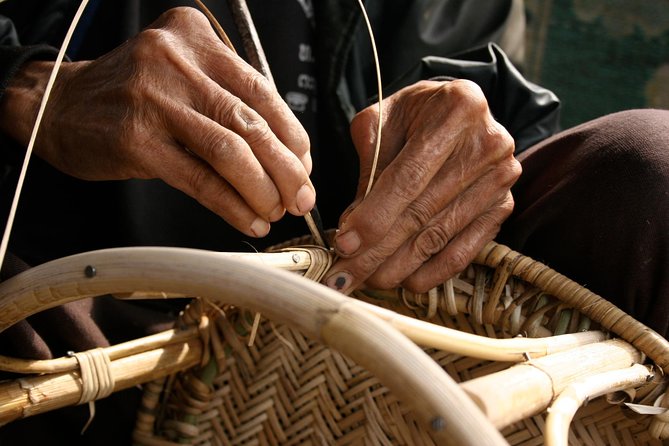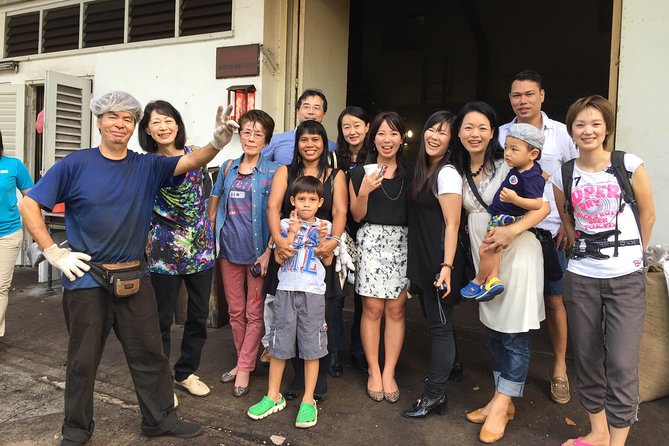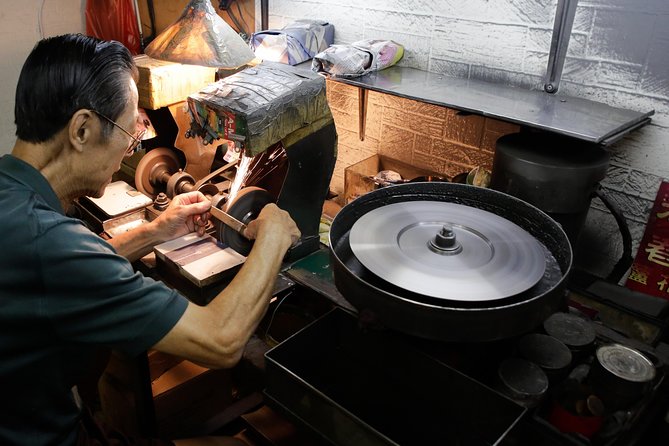Singapore’s disappearing trades offer a captivating glimpse into the city-state’s rich cultural heritage. From traditional coffee-making to ancestral paper craft, these vanishing artisanal practices represent a unique aspect of Singaporean identity that’s often challenging to uncover. Guided tours provide an immersive opportunity to explore these time-honored techniques, offering insider knowledge and personal connections that can be difficult to access independently. As these trades continue to fade, understanding their significance becomes increasingly important, both for preserving cultural traditions and for providing visitors a deeper appreciation of Singapore’s diverse identity.
Key Points
- Disappearing trades refer to traditional occupations and practices that are gradually fading due to modernization and societal changes.
- Guided tours provide immersive experiences into the history, processes, and cultural significance of disappearing trades, such as traditional coffee making, bakery, and paper craft.
- Preserving disappearing trades is crucial to maintaining a city’s cultural heritage and passing down artisanal knowledge to future generations.
- Independently uncovering the nuances of disappearing trades can be challenging, and private guided tours offer insider knowledge and access to these unique practices.
- The guided tour highlights how traditional coffee factories, bakeries, and paper craft houses are struggling to survive amid the pressures of modernization and urbanization.
Guided Half-Day Tour

This guided half-day tour in Singapore takes visitors on an immersive journey to explore three disappearing trades that offer a glimpse into the city-state’s rich cultural heritage.
Over the course of the half-day, guests will visit a traditional coffee factory, a beloved local bakery, and a paper craft house.
They’ll learn about the origins of coffee in Singapore, the intricate process of traditional bread-making, and the significance of ancestral offerings.
The tour provides a unique opportunity to gain insights that are difficult to uncover on one’s own, with a private guide offering their full attention.
Guests can savor freshly brewed coffee and warm, homemade bread, creating an authentic and memorable experience.
You can also read our reviews of more tours and experiences in Singapore.
Three Disappearing Trades

The tour immerses visitors in the rich cultural heritage of Singapore by exploring three disappearing trades that offer a glimpse into the city-state’s vibrant past. Guests will discover the origins of coffee production, witness the intricate process of traditional bread-making, and learn about the significance of ancestral offerings at a paper craft house.
| Trade | Insight Gained | Hands-On Experience |
|---|---|---|
| Traditional Coffee Factory | Learn about the history and preparation of Singapore’s iconic kopi | Sample freshly brewed coffee |
| Traditional Bakery | Observe the time-honored techniques used to create local breads | Taste freshly baked delicacies |
| Paper Craft House | Explore the cultural meaning and craftsmanship behind ancestral offerings | Gain an appreciation for this vanishing art form |
This immersive tour offers a rare opportunity to connect with Singapore’s disappearing trades and uncover the stories that define the island’s rich cultural tapestry.
Insights Hard to Discover
Discovering the nuances and stories behind Singapore’s disappearing trades can prove challenging for visitors exploring the city-state on their own.
Private guided tours offer a unique pathway to uncover the insights and experiences that are often difficult to access independently. By working closely with local experts, tour-goers can gain a deeper understanding of the historical context, cultural significance, and artisanal techniques associated with these fading professions.
From the intricate processes involved in traditional coffee roasting to the time-honored methods of crafting ancestral paper offerings, the private guide’s insider knowledge and personal connections unlock a level of intimate access that self-directed exploration simply can’t replicate.
This specialized access allows visitors to appreciate the full depth and richness of Singapore’s disappearing trades.
Traditional Coffee Factory

On the tour, visitors can explore the fascinating history and intricate process of traditional coffee production in Singapore. At the first stop, the private guide leads the group through a family-run coffee factory, where they’ll witness the meticulous roasting, grinding, and packaging techniques that have been passed down for generations.
| Key Steps | Equipment Used | Duration |
|---|---|---|
| Roasting | Drum roasters | 15-20 minutes |
| Grinding | Burr grinders | 5-10 minutes |
| Packaging | Weighing scales, sealing machines | 10-15 minutes |
The guide shares insights into the origins of Singapore’s coffee culture, explaining how local beans and preparation methods developed over time to create the unique flavors and rituals beloved by Singaporeans today.
Traditional Bakery Visit
After exploring the traditional coffee factory, visitors continue their journey by stepping inside a family-owned bakery that has been operating for decades, passing down the secrets of time-honored bread recipes.
Here, they’ll witness the art of traditional bread-making, with the baker skillfully kneading dough and shaping it into fluffy loaves. Visitors learn about the origins of the bakery’s signature items, such as the iconic Hainanese bread, and how the recipes have evolved over generations to suit local tastes.
As the aroma of freshly baked bread fills the air, guests have the opportunity to sample the warm, fragrant results of the baker’s craft, gaining a deeper appreciation for this disappearing trade.
- Historical Singapore Bike Tour on Full-Sized Bicycles
- Puzzle Hunt Adventure – Fort Canning
- New Worlds End: The Only Street Immersive Tour in Singapore
- Half Day or Full Day Private Custom Walking Tour of Singapore
- Southern Islands Mission Impossible Tour With RHIB Boat
- Kayak Sailing in Singapore, Mangrove, Kelong & Pulau Ubin, Seafood Meal Included
Paper Craft House
The final stop on the tour takes visitors to a family-run paper craft house, where they witness the intricate and time-honored process of creating traditional paper offerings. The skilled craftspeople here have spent decades honing their techniques, passing down their knowledge through generations. Visitors can observe the artisans as they meticulously cut, fold, and assemble a variety of paper items, from intricate prayer papers to elaborate funeral offerings.
| Step | Description |
|---|---|
| 1. Paper Selection | The artisans carefully choose high-quality papers, ensuring they have the right texture and durability for the intended purpose. |
| 2. Cutting | Using specialized tools, the craftspeople precisely cut the papers into the desired shapes and patterns. |
| 3. Folding | With practiced hands, the artisans skillfully fold the papers, creating the unique three-dimensional forms. |
| 4. Assembly | The final stage involves carefully assembling the various components, resulting in the finished paper offering. |
| 5. Attention to Detail | Throughout the process, the artisans maintain a meticulous attention to detail, ensuring each piece is a work of art. |
Ancestral Offerings Activity
At the paper craft house, visitors get the chance to learn about the significance of traditional ancestral offerings.
These paper crafts play a crucial role in many cultural and religious ceremonies across Singapore. The artisans demonstrate how they meticulously craft intricate paper items like joss paper, prayer items, and decorative accessories.
Visitors gain insights into the beliefs and customs surrounding these offerings, which are burned during festivals and ceremonies to honor ancestors. They’ll discover how these practices, though centuries-old, continue to hold deep meaning for many Singaporeans.
Guided Tour Experience
Throughout the guided tour, participants gain a comprehensive understanding and appreciation for Singapore’s disappearing trades. The private guide provides their full attention, offering in-depth insights and hands-on experiences that would be difficult to discover independently. Visitors actively engage with each activity, learning about the origins, traditions, and cultural significance of the trades.
The tour includes:
-
Exploring a traditional coffee factory to understand the history and production process of Singapore’s iconic kopi
-
Visiting a time-honored bakery to learn about the art of traditional bread-making
-
Discovering the intricate craft of paper offerings at a family-run business
Sampling freshly brewed coffee and warm, freshly-baked bread for an authentic taste of Singapore’s heritage.
Frequently Asked Questions
How Can I Arrange a Private Tour for a Larger Group?
To arrange a private tour for a larger group, customers can contact the tour operator directly. They’ll be able to accommodate group sizes and provide pricing information. This allows the group to experience the tour privately at their convenience.
What Are the Tour Options for Travelers With Disabilities?
Unfortunately, this private guided tour in Singapore is not wheelchair accessible. However, the tour operator may be able to accommodate travelers with other disabilities by modifying the itinerary or providing additional assistance. It’s best to discuss any special needs with the tour provider directly.
Can the Tour Be Customized to Focus on Specific Trades?
Yes, the tour can be customized to focus on specific disappearing trades. The private guide can tailor the itinerary to highlight the trades most interesting to the traveler, providing an in-depth exploration of those unique facets of Singaporean culture.
Are There Any Age Restrictions or Requirements for the Tour?
The tour has no age restrictions, and is suitable for all ages. However, it may not be wheelchair accessible, so guests with mobility needs should inquire about accommodations. The private nature of the tour allows customization to focus on specific trades of interest.
What Is the Cancellation and Refund Policy for the Tour?
The tour has a flexible cancellation policy – full refunds are available up to 3 days before the tour date, and 50% refunds 1-3 days prior. No-shows or cancellations within 24 hours are non-refundable.
Recap
The disappearing trades tour provides a unique opportunity to explore Singapore’s rich cultural heritage.
Visitors can gain insider knowledge and personal connections as they witness the meticulous preparation of traditional kopi, the time-honored techniques of local bread-making, and the intricate craftsmanship behind ancestral paper offerings.
These guided experiences offer a valuable glimpse into artisanal practices that are increasingly challenging to uncover in the rapidly modernizing city-state.
More Tour Reviews in Singapore
- Departure From Singapore City to Singapore Airport by Sedan
- Wondrous Wildlife @ River Wonders + Roundtrip Transfers
- Wild Wild Wet Singapore Admission Ticket
- Singapore: Marina Bay Sands Observation Deck Skip the Line E-Ticket
- Gardens By The Bay Night Long-Exposure Photography
- Experience Rainforest Terrarium Workshop in Yishun
Not for you? Here's more things to do in Singapore we have recnetly reviewed
- 2 Best Canoe And Kayak Experiences In Singapore
- 25 Best Cruises And Boat Tours In Singapore
- 25 Best Food Tours In Singapore
- 11 Best Full-Day Tours In Singapore
- 2 Best 3 Day Tours In Singapore
- 2 Best 4 Day Tours In Singapore
- 7 Best Lunch Experiences In Singapore
- 7 Best Dining Experiences In Singapore
- 6 Best Dinner Tours In Singapore
- Airport Transfer: Singapore to SIN Airport by Business Car
- Guided Walking Tour to the Historical Attractions in Farrer Park
- Highlights of Singapore Instagram Tour
